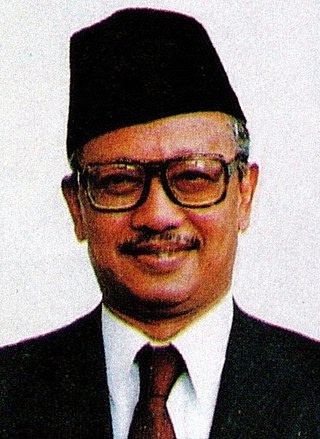
Mochtar Kusumaatmadja was an Indonesian diplomat and politician. He was Indonesia's minister of justice from 1974 until 1978 and foreign minister from 1978 until 1988.

Ide Anak Agung Gde Agung, alternatively spelled too as Ida Anak Agung Gde Agung, was an Indonesian ethnic-Balinese politician, historian, and National Hero, who was the Raja of Gianyar, Bali, and served as the prime minister of the State of East Indonesia from 1947 to 1949, and the Foreign Affairs Minister of Indonesia from 1955 until 1956.
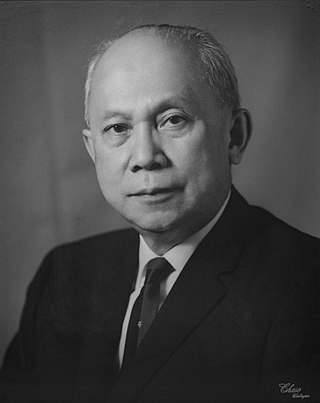
Lambertus Nicodemus Palar, also known as Babe Palar, represented the Republic of Indonesia in various diplomatic positions most notably as the first Indonesian representative to the United Nations. He also held ambassadorships in India, West Germany, the Soviet Union, Canada, and the United States. He was the son of Gerrit Palar and Jacoba Lumanauw.
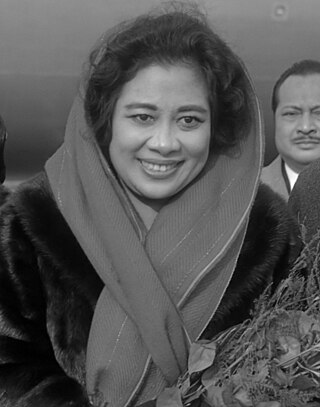
Fatmawati was a National Hero of Indonesia. As the inaugural First Lady of Indonesia, she was the third wife of the first president of Indonesia, Sukarno, and the mother of Indonesia's first female president, Megawati Sukarnoputri. She constructed the first flag flown by Indonesia.

Teuku Mohammad Hasan was an Indonesian politician and national hero from Aceh, who served as the first and only governor of Sumatra from 1945 until 1948. He also served as a cabinet minister in Sjafruddin Prawiranegara's emergency cabinet and was a member of both the Senate of the United States of Indonesia (USI) and the Provisional People's Representative Council (DPRS) of the Republic of Indonesia.

Soepomo was an Indonesian politician and lawyer who served as the country's first Minister of Justice from August until November 1945 and again from December 1949 until 6 September 1950. Known as the father of Indonesia's constitution, he was posthumously declared an Indonesian National Hero by President Sukarno in 1965.

Dr. Sahardjo LL.B., was a National Hero and Minister of Justice of Indonesia during the First, Second, and Third Working Cabinets.
National Hero of Indonesia is the highest-level title awarded in Indonesia. It is posthumously given by the Government of Indonesia for actions which are deemed to be heroic, defined as "actual deeds which can be remembered and exemplified for all time by other citizens" or "extraordinary service furthering the interests of the state and people". The Ministry of Social Affairs gives seven criteria which an individual must fulfill, as follows:
- Have been an Indonesian citizen who is deceased and, during his lifetime, led an armed struggle or produced a concept or product useful to the state;
- Have continued the struggle throughout his life and performed above and beyond the call of duty;
- Have had a wide-reaching impact through his actions;
- Have shown a high degree of nationalism;
- Have been of good moral standing and respectable character;
- Never surrendered to his enemies; and
- Never committed an act which taints his or her legacy.
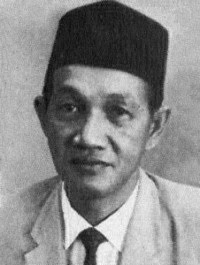
Idham Chalid was an Indonesian politician, religious leader, and minister, who served as Chairman of the People's Consultative Assembly and Chairman of the People's Representative Council from 1972 until 1977. He was also a prominent leader of the Nahdlatul Ulama (NU) and leader of the United Development Party (PPP), from 1956 until 1984.

I Gusti Ketut Pudja was an Indonesian politician and national hero, who served as the first governor of Lesser Sunda from 1945 until 1946. He was a member of the Investigating Agency for Preparatory Work for Indonesian Independence (BPUPK). He was also present at Admiral Tadashi Maeda's house, during the preparation for the Proclamation of Indonesian Independence on 17 August 1945. Making him the only Balinese to be present during the proclamation.

Iwa Koesoemasoemantri was an Indonesian politician. Born in Ciamis, West Java, Iwa graduated from legal school in the Dutch East Indies and Netherlands before spending time at a school in the Soviet Union. After returning to Indonesia he established himself as a lawyer, nationalist, and, later, a figure for workers' rights. During the first twenty years of Indonesia's independence Iwa held several cabinet positions. After retiring he continued to write. In 2002 Iwa was declared a National Hero of Indonesia.

Izaak Huru Doko is a Timorese National Hero of Indonesia. The title was granted on 3 November 2006.

Sulaiman Effendi Kusumah Atmaja was an Indonesian judge and national hero who served as the first chief justice of the Supreme Court of Indonesia from August 1945 until August 1952. He was born to a noble ethnic-Sundanese family in Purwakarta, and obtained a law diploma from the Rechtschool in 1913. In 1919, he worked as a court clerk in Bandung, before leaving that job to continue his legal education at Leiden University. After graduating from Leiden in 1922, he returned to the East Indies, and became a judge in Batavia and later Indramayu.
Thaha Syaifuddin (1816–1904) became Sultan of Jambi in 1855. However, he refused to renew treaties imposed on his predecessors by the Dutch, who invaded Jambi in 1858 and imposed a series of sultans who, under Dutch control, reigned over much of the sultanate until 1899. Thaha, however, continued to claim the sultanate and to rule over its less accessible parts until he was killed by Dutch soldiers in 1904. In 1977, he was elevated to National Hero of Indonesia, the country's highest honor.
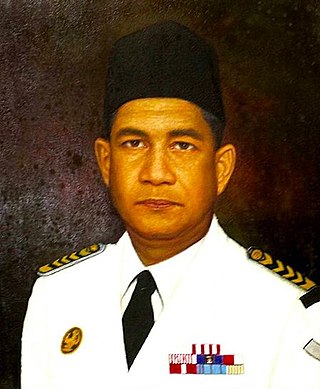
Anakletus Tjilik Riwut, more commonly referred to simply as Tjilik Riwut, was an Indonesian journalist, military officer, and politician, who served as the second Governor of Central Kalimantan from 1959 until 1967, as an Independent. He was also a major figure in the Indonesian National Revolution, becoming one of the leaders of the Kalimantan Physical Revolution in Dutch Borneo after the end of World War II, along with Idham Chalid, Hasan Basry, Mohammad Noor, and a number of other decentralized leaders.

Soetomo was an Indonesian physician and nationalist. He was the co-founder of Budi Utomo, the first native political society in the Dutch East Indies, and led the Great Indonesia Party (Parindra) from 1935 until his death. Soetomo was declared a national hero by President Sukarno in 1961.
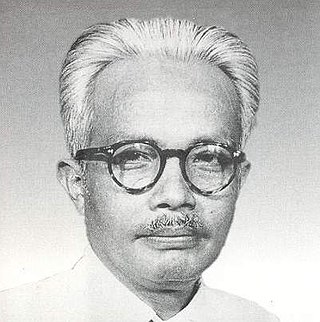
Ki Sarmidi Mangunsarkoro acted as the Minister of Education and Culture of Indonesia in 1949 until 1950. He is now regarded as a National Hero of Indonesia.

Alexander Andries Maramis, more commonly known simply as A. A. Maramis, was an Indonesian politician and National Hero of Indonesia, who was involved in the struggle for independence. He was a member of the Investigating Committee for Preparatory Work for Independence (BPUPK), the organization which drafted the Constitution of Indonesia. In the early stages of the Indonesian government, following the Proclamation of Independence, he served as both Minister of Finance and Minister of Foreign Affairs. After the end of the Indonesian National Revolution, he served as the Indonesian ambassador to several nations, including the Philippines, West Germany, and the Soviet Union.

Bernard Wilhelm "B. W." Lapian was a nationalist involved in the struggle for Indonesian independence. He published several newspapers that gave voice to the welfare of the Indonesian people and promoted Indonesian nationalism. He was also part a group who established a separate Christian denomination from the official Dutch East-Indies church institution. After Indonesia gained its independence, Lapian served as head of the district of Manado and acting governor of Sulawesi. In 2015, he was given the title of National Hero of Indonesia by President Joko Widodo.

Arnoldus Isaac Zacharias Mononutu was an Indonesian nationalist, politician, and national hero of Indonesia from North Sulawesi, who served as Minister of Information from 1949 until 1950, and the again from 1951 until 1953. He later became the first Indonesia Ambassador to China, as well as the third Rector of Hasanuddin University. A member of the Indonesian National Party, Mononutu was also involved in the struggle for Indonesia's independence. Having gained his sense of nationalism during his post-secondary studies in the Netherlands. In 2020, he was posthumously given the honorary title of National Hero of Indonesia.


















